What is a Jain diet?
A Jain diet is the way of eating outlined by the Jain religion, one of the oldest religions in India.
The Jain diet, also known as a Jaina diet, Jain vegetarian or Jain cuisine, is a plant-based diet followed by Jains, adherents of Jainism, an ancient Indian religion. Jainism emphasizes non-violence (ahimsa) towards all living beings, and a Jain diet is based on the principle of minimizing harm to living organisms. It involves abstaining from meat, fish, eggs, and other animal-derived products.
The origins of the Jain diet can be traced back to the teachings of Lord Mahavira, the 24th and last Tirthankara of Jainism. He emphasized compassion, non-violence, and respect for all forms of life. Jainism encourages followers to practice self-discipline and non-attachment to worldly possessions, which includes refraining from causing harm through their dietary choices.
In a Jain diet, fruits, vegetables, grains, legumes, nuts, and seeds play a central role. However, there are certain restrictions on the types of produce cooked with. Jains avoid consuming root vegetables such as potatoes, onions, garlic, carrots, and radishes, as these plants are believed to contain a higher number of microorganisms and are considered to have a higher likelihood of causing harm. Instead, Jains focus on consuming leafy greens, fruits, beans, lentils, and grains.
The reasons for not consuming certain vegetables and fruits lie in the principle of ahimsa. Root vegetables are avoided because uprooting them involves the destruction of the entire plant, potentially harming insects and other microorganisms residing in the soil. Onions and garlic are believed to have a strong flavor and are considered stimulants that can increase desire and attachment, thus impeding the path of spiritual progress.
Jains emphasize the purification of food before consumption to minimize harm to living organisms. This involves carefully selecting fresh produce, washing it thoroughly, and practicing mindful cooking techniques.
A Jain diet is anchored in the principles of non-violence and compassion. It promotes a plant-based lifestyle, with an emphasis on fruits, vegetables, grains, legumes, nuts, and seeds, while abstaining from root vegetables, onions, and garlic. By adhering to these dietary guidelines, Jains aim to minimize harm and live in harmony with all living beings.
At Chakra we offer a Jain menu which features dishes excluding onion, garlic, mushroom, eggplant, cauliflower and root vegetables in the preparation. Some of our customers also refrain from eating broccoli which we can also exclude from our dishes.
One might wonder with all of these excluded ingredients what is left to create great tasting recipes, but in fact there are many. Among the Jain friendly ingredients we use are pumpkin, squash of many varieties, green beans, snap peas, green peas, cabbage, lettuce, quinoa, rice, mung bean, chickpeas and many other types of beans, papaya, mango, apple, corn, dates, tomatoes and peppercorn.
From the numerous amount of Jain friendly ingredients available, including rice and rice noodles, we're able to cook a variety of Thai dishes that are compatible within a strict Jain diet. There include Pad Kee Mao and Pad See U cooked with our house-made wide rice noodles made without potato starch (which is what most NYC noodle vendors use in their recipes). Classic recipes such as papaya salad, mango salad and Pad Thai are a natural fit and among our favorite dishes for Jain diners.
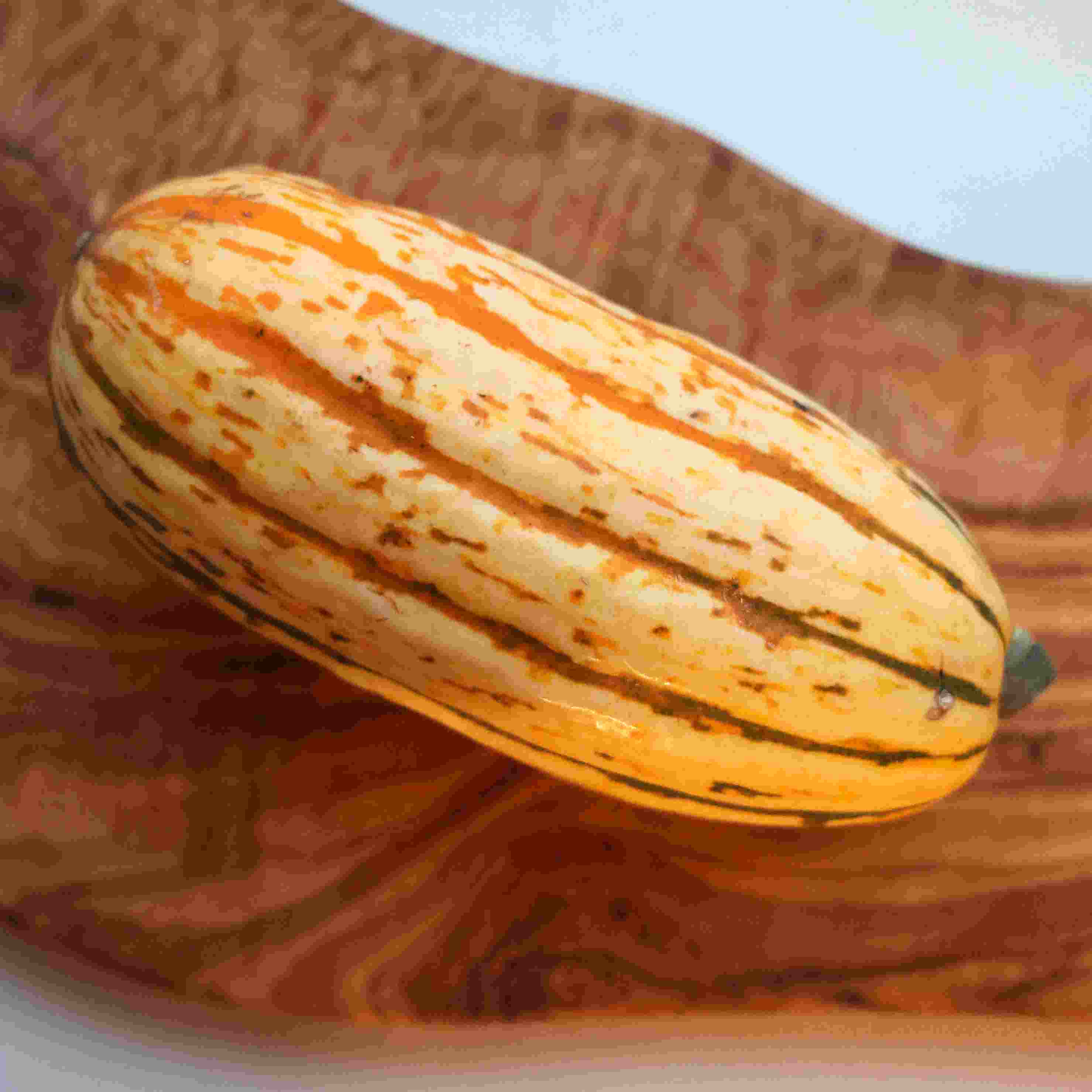
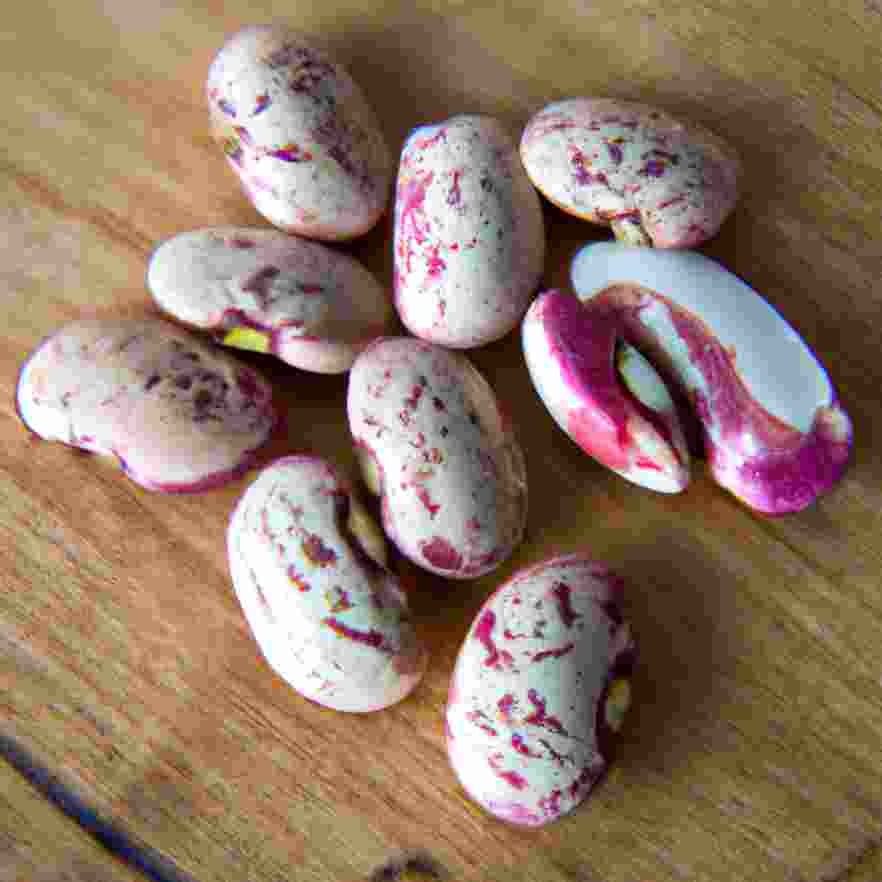
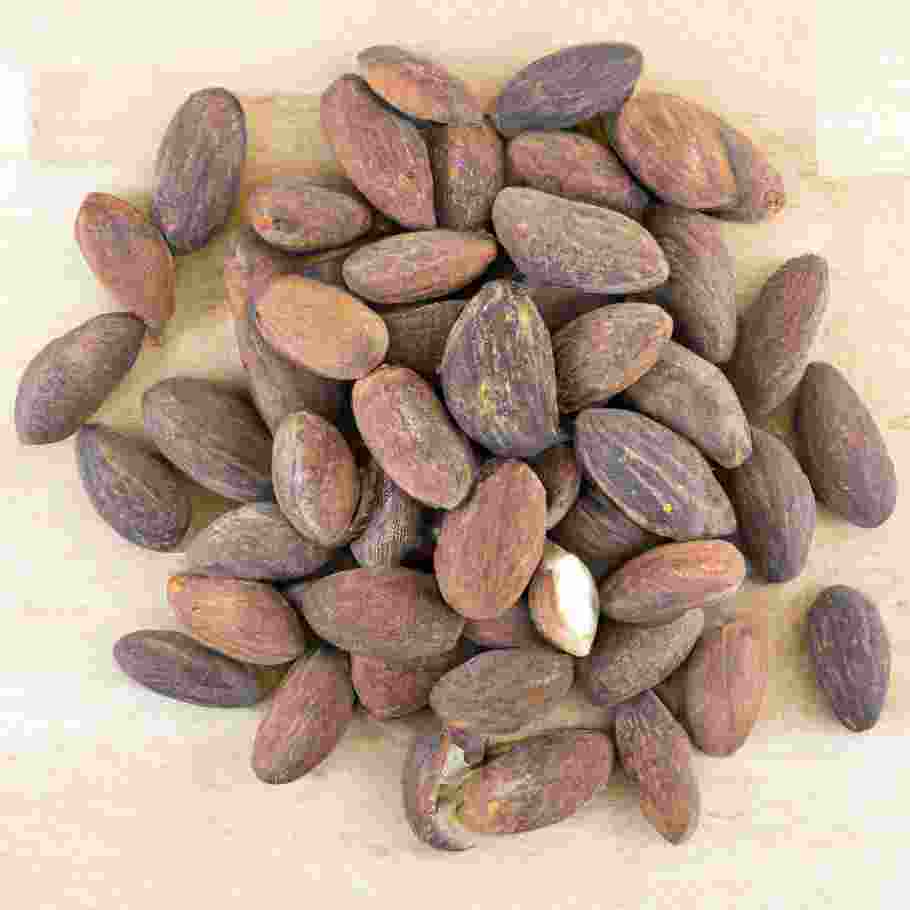
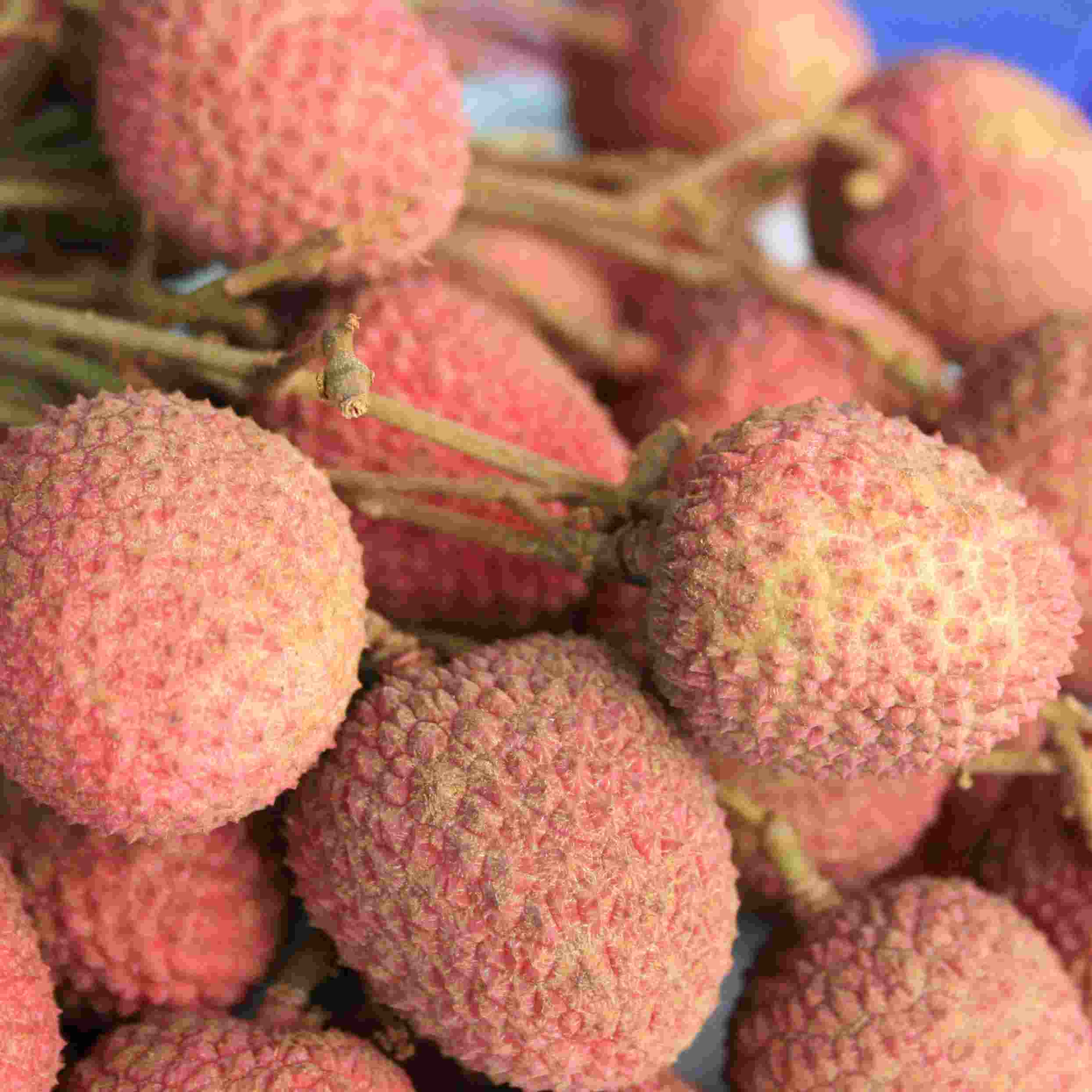
Jain philosophy also calls for a certain discipline regarding how and when food should be prepared and consumed. For example, cooking during the evening is to be avoided because centuries ago when cooking was done on fires in open air environments, the light would attract insects and consequently contribute to the destruction of insect life.
Additionally, eating too late in the evening is to be avoided as well, and prepared meals should not be kept overnight. Our process at Chakra includes the daily sourcing of ingredients and making all of our menu items to order, which is conveniently compatible with a Jain diet since we only store our whole ingredients overnight. We generally cut the produce we use on the day it will be served.
Jain friendly dining also means drinking water that is as pure as possible. At Chakra we triple-filter the drinking water we serve, making it Jain friendly as well.
The Jain diet is deeply intertwined with the philosophical underpinnings of Jainism, particularly the principles of ahimsa, anekantavada, and non-attachment. The movement originated in the Indian subcontinent, particularly in Bihar and Uttar Pradesh, and spread to various regions including communities in western and southern India with significant Jain populations forming in states such as Gujarat, Rajasthan, Maharashtra, and Karnataka. These regions have historically been strongholds of Jain influence, and the community has contributed significantly to the cultural and economic fabric of these areas. The rules on cooking and eating within Jainism are a manifestation of the commitment to non-violence and a harmonious coexistence with the environment. The Jain diet stands as a testament to the profound impact of ethical principles on the culinary traditions of a community.
The strong emphasis on non-violence (ahimsa), truth (satya), non-stealing (asteya), chastity (brahmacharya), and non-possession or non-attachment (aparigraha) have guided the dietary choices of Jains and influence their approach to cooking and eating. Lord Mahavira, who is considered the twenty-fourth Tirthankara, played a pivotal role in shaping the Jain community and its dietary practices. His teachings emphasized the importance of minimizing harm to all living beings, promoting a harmonious existence with nature.
The Jain diet is primarily plant-based and is one of the most stringent vegetarian diets globally. The movement towards a vegetarian lifestyle reflects the core Jain principle of ahimsa, extending compassion not only to humans, but to all living beings.
One distinctive feature of Jain cooking is the emphasis on simplicity and purity. Jains avoid consuming fermented foods or those with a high likelihood of containing microorganisms. The concept of avoiding unnecessary harm extends to the cooking process itself. Jain cooking often involves minimal processing and uses simple methods like boiling or steaming to preserve the natural qualities of the ingredients.
As mentioned above, there are particular rules on cooking and eating within Jainism and those rules are deeply connected to the philosophy of ahimsa. Jains follow a strict code of conduct during meal preparation to minimize harm to living organisms. This involves filtering drinking water, washing vegetables thoroughly, and using utensils which have only been used for preparing and consuming vegetarian foods.
The concept of anekantavada, or the doctrine of non-absolutism, is another crucial aspect of Jain philosophy that influences dietary practices. Anekantavada recognizes the complexity of truth and advocates for open-mindedness and understanding different perspectives. This principle encourages Jains to be mindful of their dietary choices, considering the impact on the environment and the well-being of all living beings.
One way to visualize the dimensions of ahimsa and how the concept of karma relates to Jain food production and consumption is to imagine the five levels of sensory beings which is fundamental to the philosophy, as a series of concentric circles. There are five levels which are used to describe all livings things as well as the air and water. The first level is where food should be acquired according to the philosophy. The following diagram places the first level at the center of the concentric circles. The remaining levels are represented by the outer circles with each one representing more sensitive forms of life, with organisms in all of those levels prohibited from being used as food in a Jain diet.
Known as Jivas, the five levels are named Ekendriya, Dvendriya, Trendriya, Chaturindriya and Panchendriya.
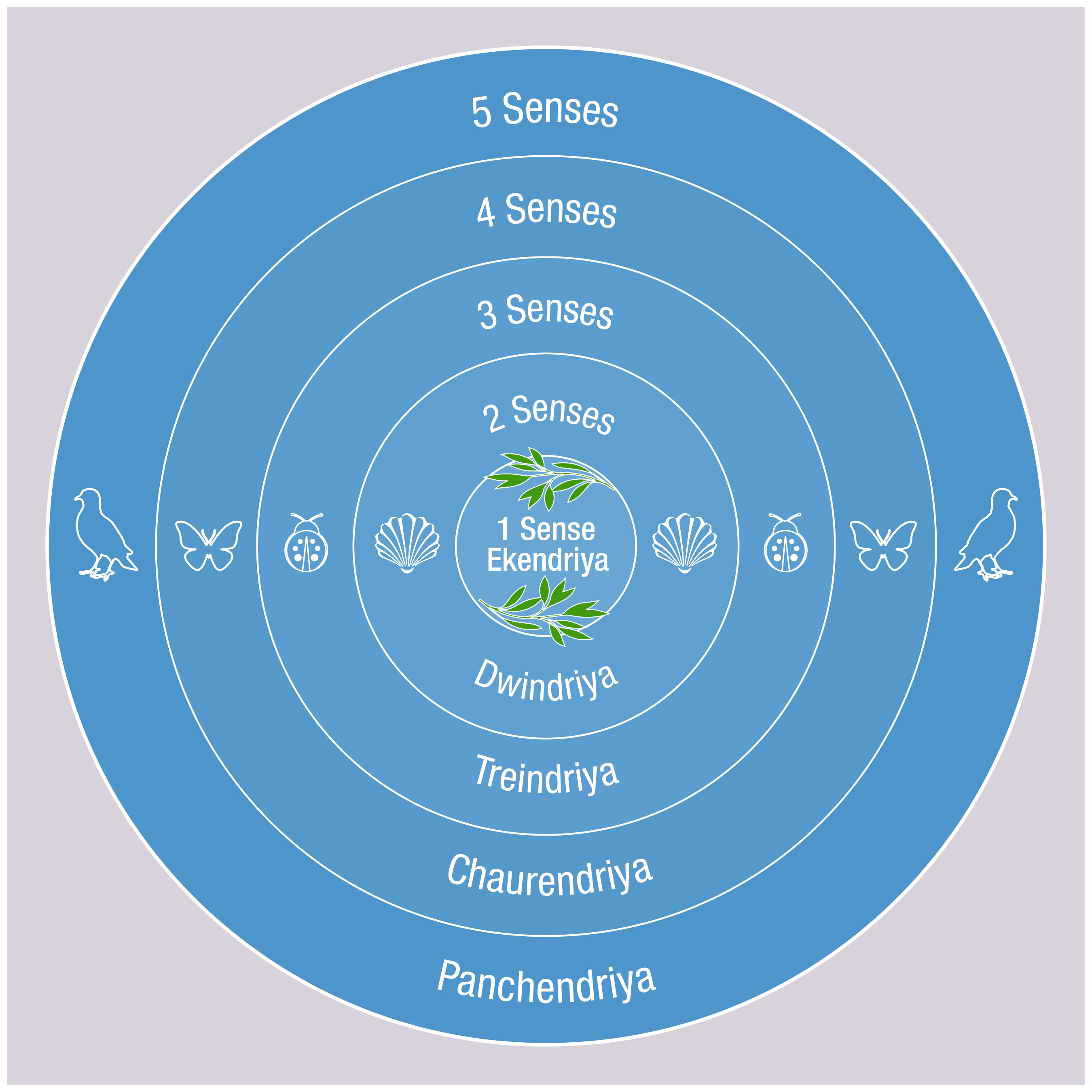
At the lowest level of the sensory hierarchy are the one-sensed beings or Ekendriya Jivas. Plants are included on this level and it encompasses all of the plant-based ingredients used in Jain cooking.
The next level comprises two-sensed beings or Dvendriya Jivas, endowed with the senses of touch (sparsha) and taste (rasana). Simple shelled animals are classified in this category. The addition of taste as a sensory faculty allows these beings to interact with their environment in a more nuanced manner.
Three-sensed beings, known as Trendriya Jivas, possess the senses of touch (sparsha), taste (rasana), and smell (ghrana). This level of sensory perception is associated with more complex life forms including butterflies. The inclusion of the sense of smell enhances their ability to navigate and interact with their surroundings.
Chaturindriya Jivas, or four-sensed beings, have the senses of touch (sparsha), taste (rasana), smell (ghrana), and sight (chakshu). This level of sensory complexity is characteristic of higher animals, including many vertebrates. The addition of sight allows these beings to perceive their environment visually, providing them with a more comprehensive understanding of the world around them.
The highest level of sensory perception in Jain philosophy is attributed to Panchendriya Jivas, or five-sensed beings. This category includes humans and some of the more advanced animals. These beings possess the full complement of senses: touch (sparsha), taste (rasana), smell (ghrana), sight (chakshu), and hearing (shravana). The inclusion of hearing further enriches their sensory experiences, allowing for a broader range of interactions with the external world.
The aspect of Jainism designed to provide guidance regarding one's diet is called "Ahara", which is the Sanskrit word for "food". There are many layers and hierarchical categories that are part of the Jain philosophy on sourcing, preparing and eating food, with three top categories describing the type of food itself.
In Jain philosophy, the concept of Ahara categorizes food based on its nature and impact on spiritual well-being, aligning with the principles of non-violence (ahimsa) and spiritual purity. Ahara classifies food into three main categories: Sātvika, Rājasika and Tāmasika. The first category consists of all foods compatible with a Jain diet. The second category includes foods that should only be consumed in moderation. The third category describes food and beverages which should be avoided altogether.
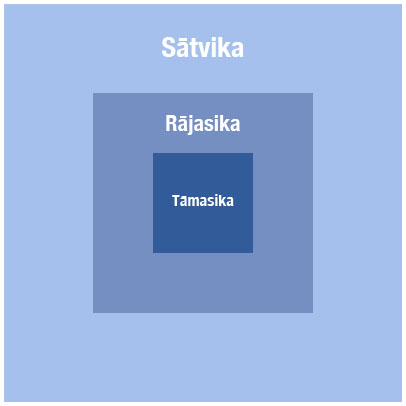
This category includes foods that are considered pure, nutritious, and conducive to spiritual well-being. Sātvika Ahara comprises fresh fruits, vegetables, grains and nuts. The emphasis is on consuming simple, unprocessed, and wholesome foods that promote mental clarity and spiritual purity.
Rājasika Ahara consists of foods that are considered passionate and may have stimulating or agitating effects on the mind and body. This category includes spicy foods, stimulants like caffeine, and strongly flavored items. Jain philosophy suggests moderation in consuming Rājasika Ahara to maintain balance and avoid negative impacts on one's spiritual journey.
Tāmasika Ahara encompasses foods that are considered impure, dull, or detrimental to spiritual progress. This category includes meat, alcohol, and foods that are stale or overly processed. Jains strictly avoid Tāmasika Ahara due to its association with violence, ignorance, and negative energy.
The categorization of food in Ahara reflects the Jain commitment to mindful and ethical eating, aligning with the broader goal of spiritual purification and the pursuit of liberation from the cycle of rebirth.
The following are questions we're commonly asked at Chakra by customers not familiar with a Jain diet.
A Jain diet is the way of eating outlined by the Jain religion, one of the oldest religions in India.
With the exception of certain types of produce, Jain food naturally fits within a vegan diet since no animal products are used to make the food. The main difference between vegan and Jain food is that vegan food encompasses every edible plant-based ingredient, while Jain food consists of a more narrow set of plant-based ingredients.
Jains don't eat onion, garlic, root vegetables such as carrots, mushrooms, eggplant and certain other produce containing large amounts of seeds. Some Jains do not eat noodles or other food that has been heavily modified from its natural form.
Jains don't eat eggplant primarily because of the many seeds found inside it.
Jain food typically consists of dishes made using squash, pumpkin, corn, wheat and other produce not containing large amounts of seeds, though there are a small number of exceptions. At Chakra we use both common and uncommon ingredients due to the special Thai-Indian dishes we prepare.
Typical Jain meals consist of curries and rice dishes. At Chakra all of our dishes can be made Jain friendly including the noodle dishes and dumplings. Our Jain menu items are distinct in that they are primarily Jain friendly Thai-Indian dishes.
Rice, lentils, beans, nuts, cucumbers, berries, apples, grapes, mangoes, pumpkin, zucchini and string beans are just several of numerous food ingreidents that Jain people can eat. There are hundreds of plant-based ingredients that Jains can eat.
Jains don't eat garlic since it grows underground and the earth around the plant must be disturbed when harvesting it. Jain philosophy also prohibits the use of root bulbs which if harvested, prevent the plant from reproducing.
Like garlic, Jains don't eat onion since it grows underground and harvesting the bulbs prevent the plant from reproducing.
Jains do not eat carrots because they are root vegetables, and harvesting carrots typically involves destroying the entire plant and disturbing the soil ecosystem which supports the plant.